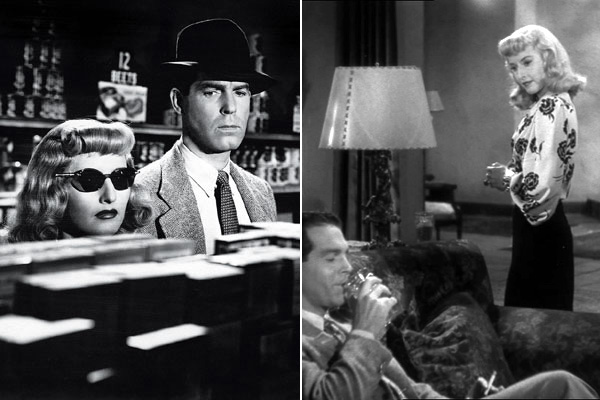As the film starts, we hear ominous music and see a man’s silhouette, a tall, broad-shouldered man, walking toward us on crutches. A car careens through the dark streets of sunny Los Angeles.
Walter Neff (Fred MacMurray) an insurance salesman, casually stops by to see a prospect, a man whose automobile insurance needs renewing, hoping to make a sale. He has disdain for the man’s largish Spanish style house and trappings of wealth, but not for his spouse, Phyllis Dietrichson (Barbara Stanwyck), a sexy/sleazy trophy wife. Walter admires her anklet, and classic double entendre ensues, not too obvious or burdened with tacky humor.

Phyllis’s husband is deeply unappealing, a heavy drinker, and abusive. Phyllis just wants to live as a happy housewife in a big house and be able to buy shoes and dresses without being hassled by a drunk. And a tryst between Phyllis and Walter would be hot, the sort that any red-blooded American who doesn’t study the Bible every day would most certainly approve of. Add in a boatload of insurance money and you’ve got a marriage made in heaven. So why not kill Mr. Dietrichson?
Phyllis casually suggests murder by way of a few simple questions about life insurance. Walter says it can’t be done, and storms out, but he soon overcomes these initial qualms. Walter and Phyllis trick Mr. Dietrichson (we never learn his first name) into signing a life insurance policy, one with the famous “double indemnity” clause. Walter pushes for this, even though it’s risky. A double payoff in case of accidental death. Double or nothing, they’ve got to have it all. He then plots the murder. Phyllis proves to be an apt pupil.
At first the crime is accepted as an accident. Barton Keyes (Edward G. Robinson) the insurance “claims man,” is initially not suspicious. Only the prim company president, Mr. Norton (Richard Gaines) thinks something is fishy, but his clumsy attempt to get the grieving wife to settle for less money results in his humiliation when Phyllis convincingly laces into him. She’s good.
But questions arise. Keyes gets on the case, spots an inconsistency, and we can see that the it couple of 1944 is doomed. As Phyllis tells Walter, in one of the movie’s great lines, “nobody’s pulling out. We went into this together and we’re coming out at the end together. It’s straight down the line for both of us.”
It’s a great story, a classic American story, and perfect for the movies. In 1935, when the James M. Cain novel (based on the Ruth Snyder/Judd Gray murder case) was first published, Cain’s agent sent copies to the major studios. All were interested, but it would take nine years to get Double Indemnity to the screen. Joseph Breen of the Hays Office deemed the material too indecent for Hollywood, writing, “The general low tone and sordid flavor of this story makes it, in our judgment, thoroughly unacceptable for screen presentation….”
He had a point. Double Indemnity depicts the characters’ base and ignoble motivations in an ordinary, matter-of-fact manner. The film accepts their actions as human, and we understand and sympathize with the murderers’ motivations and feelings. Probably half the viewers think they should get away with it.
Eight years later, when Paramount decided to make the movie (incorporating some changes to gain the approval of the Hays Office), Wilder’s usual collaborator, Charles Brackett, bowed out of co-writing the script, finding the story immoral. Wilder turned to the great noir author Raymond Chandler, in what proved to be a great professional opportunity for Chandler, and a boon for the film—a lot of the best lines come from Chandler and not the original text. Unfortunately, working with Wilder didn’t work out so well for him personally. Chandler was an alcoholic, desperately trying to stay on the wagon, and the pressures of collaboration with the irascible and provocative director, who viewed discord as a necessary part of the creative process, lead Chandler back to the bottle. Or, as Wilder admitted, “He was in Alcoholics Anonymous, and I think he had a tough time with me—I drove him back into drinking….”
Double Indemnity received seven Academy Award nominations, but garnered no wins—the decidedly more wholesome Going My Way won Best Picture.
This is a seventieth anniversary restoration, and it looks and sounds great. The cinematography of John Seitz captures darkness brilliantly. (Wilder later said, “He went to the limits of what could be done.”) The score, by Miklós Rózsa, is melodramatic without being trite. Seventy years later, and it is still discomforting to look at murder for money.
Double Indemnity, directed by Billy Wilder, starring Fred MacMurray, Barbara Stanwyck, and Edward G. Robinson, written by Billy Wilder and Raymond Chandler, at Film Forum, through Thursday, August 7, in a new restoration.
—Franklin Mount
Film Reviews